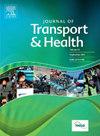美国长途运输卡车司机的生物社会健康:道路综合症
IF 3.2
3区 工程技术
Q2 PUBLIC, ENVIRONMENTAL & OCCUPATIONAL HEALTH
引用次数: 0
摘要
导言由于日常和持久的经济和其他压力、恶劣的工作条件以及常见的行为和做法模式,长途卡车司机是一种生理压力大、对生物和心理都具有挑战性的工作,不利于健康生活或日常保健。这种职业的工作环境符合 "风险环境 "的定义,即各种因素相互作用增加伤害发生几率的空间。以前对这一人群的研究往往集中在一两个主要的健康状况上,或单独研究卡车司机特定的生活方式和工作环境导致的多种健康状况,而较新的健康模型,如综合症理论,则考虑了在一系列相关的健康社会决定因素中相互关联的合并疾病之间的协同互动。这种方法关注的是评估相互交织的生活/工作条件如何促进疾病和其他健康因素的聚集和不良相互作用。方法本文回顾了已确定的文献,这些文献涉及:长途卡车司机工作条件的性质和造成这些条件的因素、与这些条件相关的健康风险、这一人群中常见疾病的潜在综合症相互作用以及疾病相互作用的途径。由于涉及多种文献,本文没有采用系统综述的方法:本文重点关注美国长途运输卡车司机--他们可能从一个海岸线到另一个海岸线,在路上奔波数周,有时甚至数月。本综述证实,综合征研究方法非常适合应对更好地了解和改善工人健康这一挑战。综合症视角促使研究人员对人群的健康状况进行全面的生物社会学分析,并考虑生物社会学和多种疾病的干预措施。 结论 本文采用综合症视角对美国长途运输卡车司机的主要健康风险进行了回顾,确定了增加其行为和其他健康风险的因素,并提出了需要公共卫生干预的可能的协同健康后果。鉴于道路辛迪加对健康、社会和经济造成的严重后果,有必要在研究、资金和政策方面扩大对这一问题的关注。本文章由计算机程序翻译,如有差异,请以英文原文为准。
The biosocial health of U.S. long haul truckers: Syndemics of the road
Introduction
Due to daily and enduring economic and other pressures, poor working conditions, and a common pattern of behaviors and practices, long-haul truck driving is a physiologically stressful and both biologically and psychologically challenging job that is not conducive to healthy living or routine healthcare seeking. The work context of this occupation fits the definition of a “risk environment,” namely a space in which a variety of factors interact to increase the chances of harm occurring. While prior research on this population has tended to focus on one or two primary health conditions or separately review multiple health conditions as a consequence of specific trucker lifestyle and working conditions, newer models of health, like syndemic theory, consider synergistic interactions among comorbid diseases that are interconnected within a set of linked social determinants of health. This approach is concerned with assessing how intersecting living/working conditions promote the clustering and adverse interaction of diseases and other health factors.
Methods
This paper reviews identified bodies of literature that address: the nature of the work conditions of long haul truckdrivers and the factors responsible for these conditions, the health risks associated with the conditions, and the potential syndemic interactions of diseases that are frequent in this population and pathways of disease interaction. Because of the multiple literatures involved the paper does not employ a systematic review approach.
Setting
and Population: The paper focuses on long haul truck drivers--who may travel coast to coast remaining on the road for weeks and sometimes months at a time--in the U.S.
Results
A number of likely syndemics common among long haul truck drivers are identified and assessed. This review affirms that a syndemics approach is well suited to the challenge of better understanding and improving worker health. A syndemics lens pushes researchers to develop a comprehensive biosocial picture of health in a population and to consider biosocial and multi-disease interventions.
Conclusion
This paper employs a syndemics lens to review the key health risks of long haul truck drivers in the U.S., identify the factors increasing their behavioral and other health risks, and suggest likely synergistic health consequences in need of public health intervention. In light of the serious consequences of the health, social, and economic cost of syndemics of the road, there is a need for expanded attention to this issue in research, funding, and policy.
求助全文
通过发布文献求助,成功后即可免费获取论文全文。
去求助

 求助内容:
求助内容: 应助结果提醒方式:
应助结果提醒方式:


